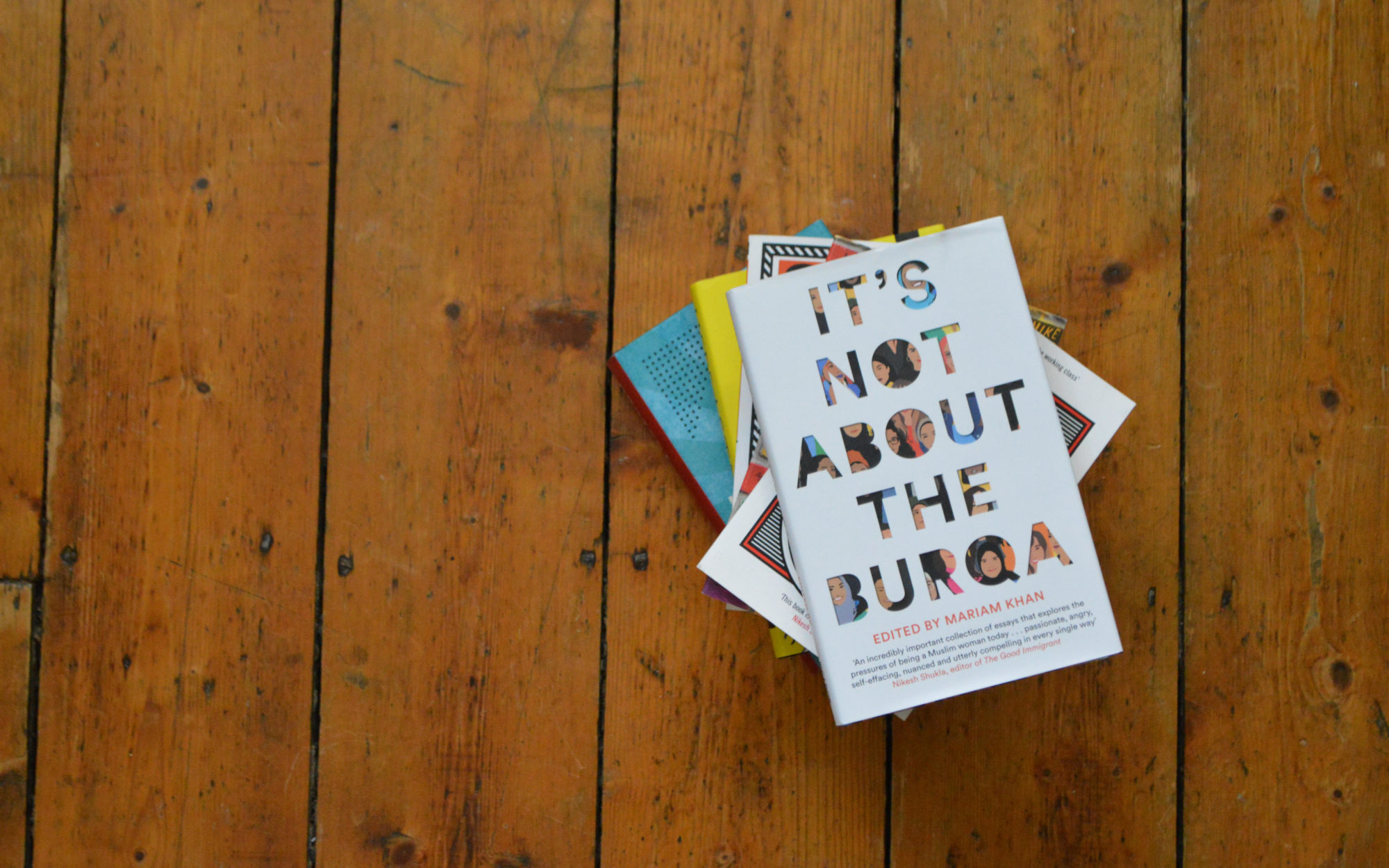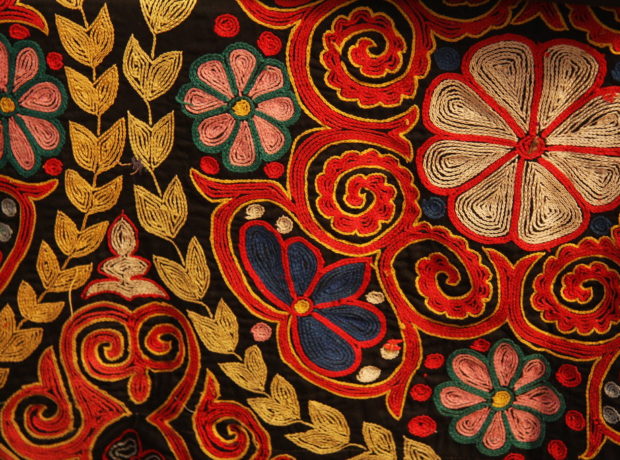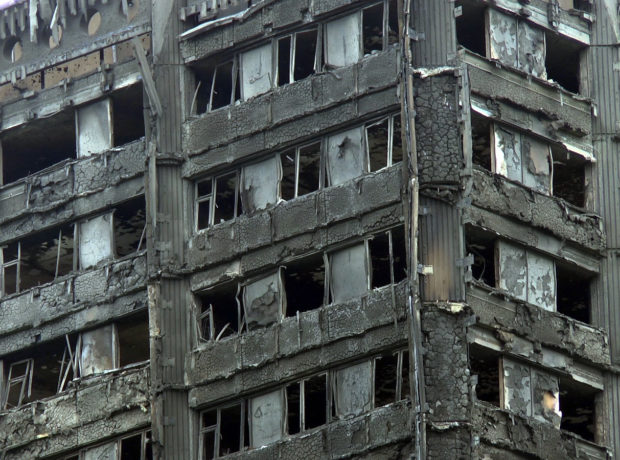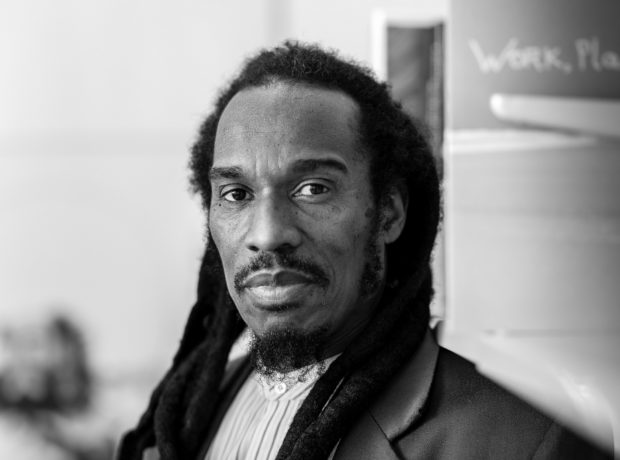These game-changing short story collections champion the voices of the working class, immigrants and Muslim women. One pays tribute to residents of Grenfell Tower, many are crowdfunded and several combine stories from both new writers and established – often award-winning – authors. If you want to read with variety and purpose there is no better place to begin.
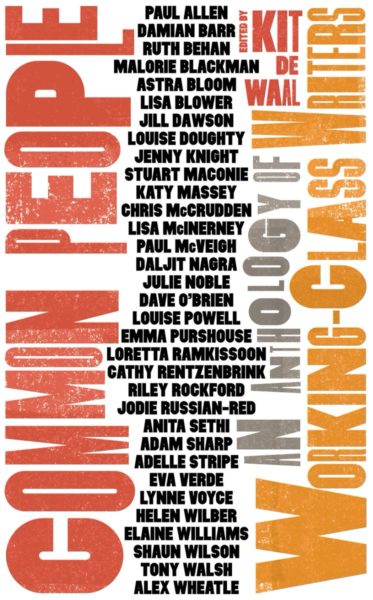
Common People (2019 Unbound)
Edited by Kit de Waal
Writers include: Tony Walsh, Stuart Maconie, Louise Doughty, Kit de Waal, Paul McVeigh.
Anthology editor Kit De Waal is a Brummie writer who has founded a scholarship for working class writers.
This collection is as glorious and unforgettable as the Pulp dancefloor filler of the same name. It opens with an electrifying poem from Manchester’s Tony Walsh, who wrote and performed This Is The Place after the terrorist bombing of the Manchester Arena in May 2017. You can almost hear him spitting out the words of this rabble-rousing rhyme which, by the end, has the reader punching the air and gunning for change.
The anthology’s 33 instalments are from a mix of professional writers and newcomers and the quality of writing is so high you won’t know which is which. This collection is lively and varied, moving and memorable.
Buy the book here.
24 Stories of hope for survivors of the Grenfell Tower fire (2018 Unbound)
Edited by Kathy Burke
Writers include: Irvine Welsh, Meera Syal, John Niven, Mike Gayle, Nina Stibbe, AL Kennedy, Pauline Melville, Murray Lachlan Young, Daisy Buchanan, Barney Farmer.
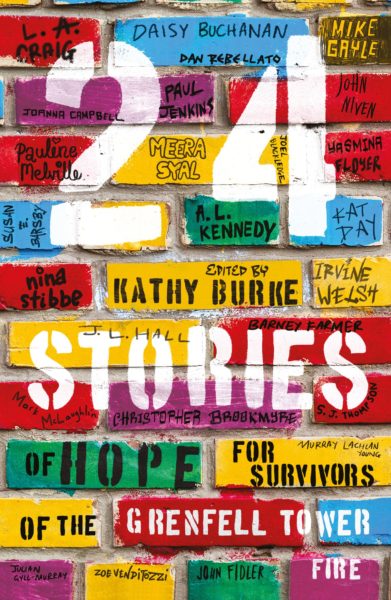
Published on the first anniversary of the fire, this book serves to remind that the survivors of Grenfell don’t only deserve help in the first months or years after the tragedy, but for the rest of their lives.
Born from a Twitter conversation between writers, the book set out to support the Post-Traumatic Stress Disorder-related needs of the survivors.
An illuminating foreword by neuroscientist Dr Dean Burnett explains PTSD, a condition Burnett has unenviable experience of.
Comic book writer Paul Jenkins, who initially, via Twitter, suggested the project to the anthology’s editor Kathy Burke, is one of 12 established authors to contribute to the book alongside 12 previously unpublished writers.
Burke (who is best known and loved as a comedian but has also worked as an actor, director and writer) selected from hundreds of submissions the final 24, one for each storey of the tower.
The collection is surprisingly uplifting, with themes of belonging, multi-culturalism and neighbourliness. There are stories laced with humour and hope, as well as a few happy endings.
Like Common People, this book was crowdfunded by publisher Unbound. All proceeds of the anthology go to Trauma Response Network- a charity set up after the Manchester Arena bomb attack to ensure that people suffering from trauma and PTSD after violent events such as the Grenfell fire get the support and therapy they need.
Buy the book here.
The Good Immigrant (2016 Unbound)
Edited by Nikesh Shukla
Writers include: Reni Eddo-Lodge, Riz Ahmed, Bim Adewunmi, Vera Chok, Varaidzo, Wei Ming Kam, Darren Chetty, Keiran Yates, Vinay Patel, Sarah Sahim, Inua Ellams, Coco Khan, Salena Godden, Miss L, Musa Okwonga.
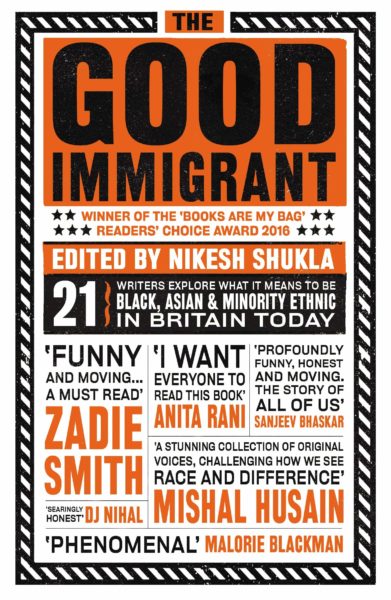
“What’s it like to live in a country that doesn’t trust you and doesn’t want you unless you win an Olympic gold medal or a national baking competition?” asks the blurb on the back.
This collection of 21 essays by writers of colour traverses a broad range of perspectives. It displays the complex web of nuance
in the personal experiences of different individuals who, by virtue of not being white, are “other”.
And at times they are suitably unsettling.
Contributors include comedian Nish Kumar and actor Riz Ahmed whose story Airports and Auditions outlines the potential pitfalls of both scenarios where he is approved or rejected, questioned or typecast, because of the colour of his skin.
The Good Immigrant is the third book in our collection that was crowdfunded by publisher Unbound, and in an age of rising xenophobia and anti-immigration rhetoric it’s a must-read.
Nikesh Shukla, with contributor Chimene Suleyman, has gone on to co-edit an American version, The Good Immigrant USA,
featuring Nicole Dennis-Benn, Mona Chalabi, Alexander Chee, Maeve Higgins, Porochista Khakpour, Daniel José Older, Jenny Zhang, Yann Demange and Fatimah Asghar.
Buy the book here.
Know Your Place: Essays on the working class by the working class (2017 Dead Ink Books)
Edited by Nathan Connolly
Writers include: Kit de Waal, Catherine O’Flynn, Peter Sutton, Dominic Grace, Wally Jiagoo.
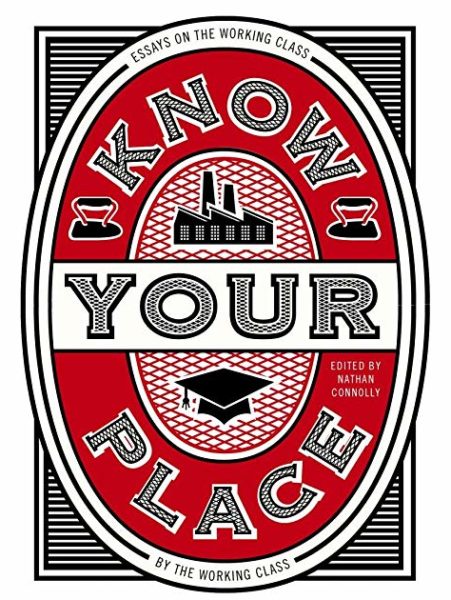
Similar to The Good Immigrant, this collection refers to the “Benefits Street” style mainstream media assumption that working class people are either “scroungers” or “the deserving poor”.
Across 22 essays, there is a collective feeling of being trapped beneath a glass ceiling and suffocated by the unattainable expectations of a society whose culture has been co-opted by the bourgeoisie.
Kath McKay describes how for a school assignment she writes about a horse, despite having no experience of a horse other than seeing the Grand National on telly – because that is what she believes is appropriate literary fodder.
Kate Fox, meanwhile, recalls how her roots became a barrier to fulfilling her dream of becoming a broadcast journalist as the news isn’t read in a northern accent.
Like three other anthologies in our collection, this book was crowdfunded, this time via Kickstarter, with all individual donors being name checked at the back.
Buy the book here.
Protest: stories of resistance (2017 Comma Press)
Edited by Ra Page
Writers include: Frank Cottrell-Boyce, Alexei Sayle, Sara Maitland, Kit de Waal, Holly Pester, Matthew Holness, Andy Hedgecock, Laura Hird, Michelle Green, Sandra Alland, Stuart Evers, David Constantine, Maggie Gee, Francesca Rhydderch, Jacob Ross, Joanna Quinn, Martyn Bedford, Juliet Jacques, Courttia Newland, Kate Clanchy.
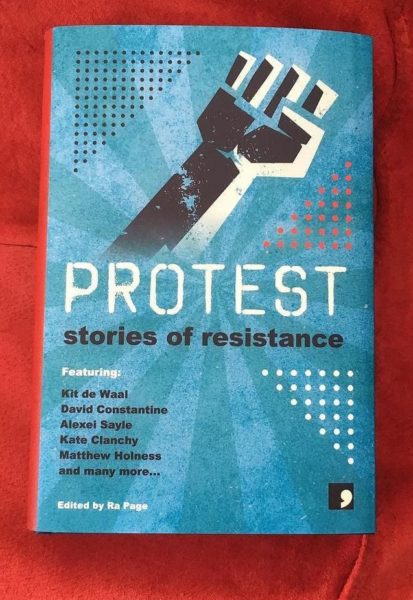
In this collection 21 writers assemble armed with flash fiction tales stretching from the 1381 Peasant’s Revolt to the Anti-Iraq War demo, via the Suffragettes and Greenham Common.
Setting this anthology apart is the unusual format in which each story is followed by an afterword from a historian, sociologist or eyewitness to the protest, combining fiction and non-fiction to produce a rich mix of entertaining and educational prose.
The anthology ends with the most recent protest, the Anti-Iraq War demo which, 17 years on, has come to symbolise a moment when modern protesters realised the ruling class had become impervious to public opinion.
Despite this, more recent displays of resistance by Occupy, the global school climate strikes and Extinction Rebellion, suggest the spirit of protest is still very much alive.
Buy the book here.
Here I Stand: Stories that speak for freedom (2016 Walker Books)
Writers include: Neil Gaiman, Matt Haig, AL Kennedy, Sabrina Mahfouz, Tim Wynne-Jones, Tony Birch, John Boyne, Sita Brahmachari, Sarah Crossan, Kate Charlesworth, Frances Hardinge, Ryan Gattis, Amy Leon, Chibundu Onuzo, Chris Riddell, Mary and Bryan Talbot, Chelsea Manning, Elizabeth Laird, Jackie Kay, Bali Rai.
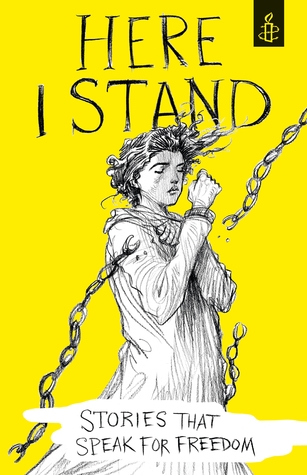
In this anthology 28 writers and artists have collaborated to produce short stories, poems, illustrations and a comic strip. It ends with a Q&A interview with Chelsea Manning.
Aimed at teenage readers, it spans topics such as capitalism and greed, LGBT-related cyberbullying, migration, poverty, homelessness, FGM/C, drone warfare, torture and the death penalty.
It’s a nice touch that each instalment is followed by a brief explanation from the author/artist about why they chose the topic they did.
All royalties from the sale of this book go to Amnesty International.
Buy the book here.
It’s not about the burqa (2019 Picador)
Edited by Mariam Khan
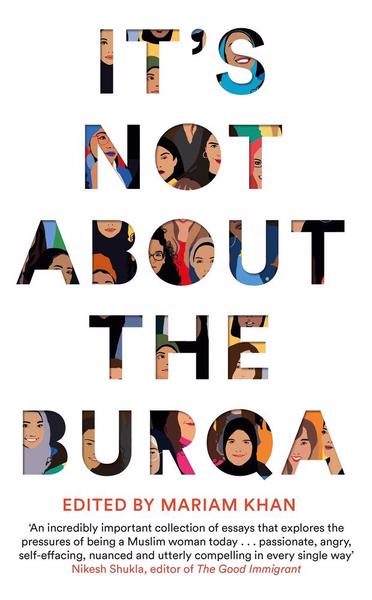
Writers include: Mona Eltahawy, Coco Khan, Sufiya Ahmed, Nafisa Bakkar, Afia Ahmed, Yassmin Midhat Abdel-Magied, Jamilla Hekmoun, Afshan D’souza-Lodhi, Salma Haidrani, Amna Saleem, Saima Mir, Salma El-Wardany, Aina Khan, Raifa Rafiq, Malia Bouattia, Nadine Aisha Jassat.
This anthology calls out the politicisation of the burqa, wrestling the microphone from those white men (David Cameron gets a nod) who use their platforms and privilege to speak about Muslim women’s “traditional submissiveness” while the voices of Muslim women continue be pushed to the fringes.
Editor Mariam Khan asks: “When was the last time you heard a Muslim woman speak for herself without a filter? Or outside the white gaze? On her own terms?”
Here 17 Muslim women write about love, divorce, feminism, sex, mental health and queer identity with anger, passion and humour.
Buy the book here.
Refugee Tales: Volumes I, II and III (2016, 2017, 2019 Comma Press)
Writers include: Monica Ali, Lisa Appignanesi, Bernadine Evaristo, Abdulrazak Gurnah, Jonathan Skinner, Gillian Slovo and Lytton Smith.
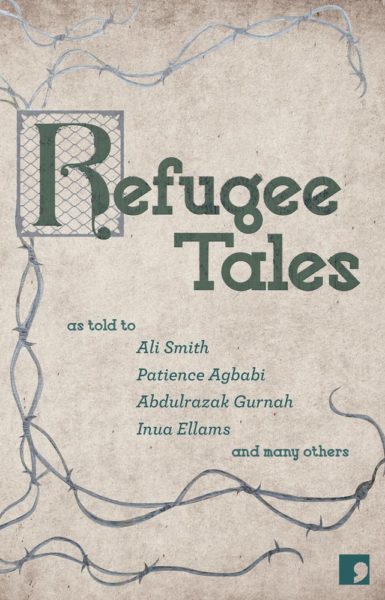
This project from Manchester independent publisher Comma Press pairs refugees with acclaimed writers to produce real-life stories of human trafficking, immigration detention and the hope of starting a new life.
A modern take on the Canterbury Tales, it features writers including Bernadine Evaristo, Monica Ali, Abdulrazak Gurnah and Gillian Slovo.
The third instalment of short stories was published last year and you can read an instalment from each volume (by Ali Smith, Helen Macdonald and Patrick Gale) here.
The project supports the Gatwick Detainees Welfare Group, a charity working with people held in indefinite immigration detention near Gatwick Airport.
Buy the book here.
Read more:
